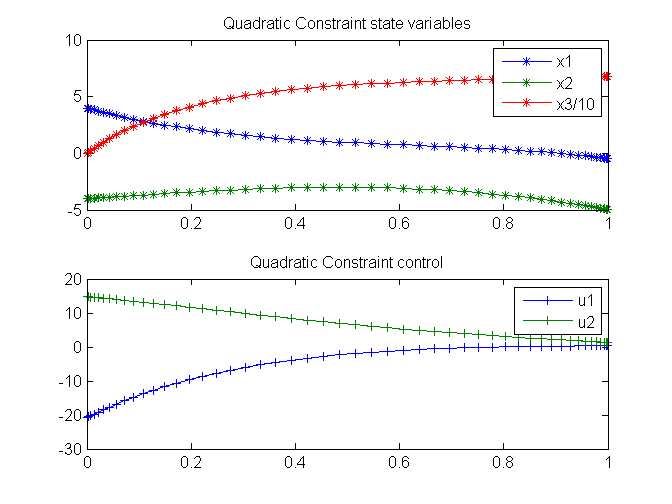PROPT Quadratic constraint problem: Difference between revisions
From TomWiki
Jump to navigationJump to search
(Created page with "{{Part Of Manual|title=the PROPT Manual|link=PROPT Manual}} Paper: LINEAR-QUADRATIC OPTIMAL CONTROL WITH INTEGRAL QUADRATIC CONSTRAINTS. OPTIMAL CONTROL APPLICATION...") |
No edit summary |
||
| Line 1: | Line 1: | ||
{{Part Of Manual|title=the PROPT | {{Part Of Manual|title=the PROPT Manual|link=[[PROPT|PROPT Manual]]}} | ||
Paper: LINEAR-QUADRATIC OPTIMAL CONTROL WITH INTEGRAL QUADRATIC CONSTRAINTS. OPTIMAL CONTROL APPLICATIONS AND METHODS Optim. Control Appl. Meth., 20, 79-92 (1999) | Paper: LINEAR-QUADRATIC OPTIMAL CONTROL WITH INTEGRAL QUADRATIC CONSTRAINTS. OPTIMAL CONTROL APPLICATIONS AND METHODS Optim. Control Appl. Meth., 20, 79-92 (1999) | ||
| Line 123: | Line 123: | ||
title('Quadratic Constraint control'); | title('Quadratic Constraint control'); | ||
</source> | </source> | ||
[[File:quadraticConstraint_01.png]] | |||
Revision as of 14:25, 2 November 2011
|
This page is part of the PROPT Manual. See PROPT Manual. |
Paper: LINEAR-QUADRATIC OPTIMAL CONTROL WITH INTEGRAL QUADRATIC CONSTRAINTS. OPTIMAL CONTROL APPLICATIONS AND METHODS Optim. Control Appl. Meth., 20, 79-92 (1999)
E. B. LIM(1), Y. Q. LIU(2), K. L. TEO(2) AND J. B. MOORE(1)
(1) Department of Systems Engineering, Research School of Information Sciences and Engineering, Australian National University, Canberra ACT 0200, Australia
(2) School of Mathematics and Statistics, Curtin University of Technology, Perth, WA 6845, Australia
Problem Formulation
Find u(t) over t in [0; 1 ] to minimize
subject to:
Introduce a new variable to remove integral in constraint:
resulting in event constraint:
% Copyright (c) 2007-2008 by Tomlab Optimization Inc.Problem setup
toms t
p = tomPhase('p', t, 0, 1, 50);
setPhase(p);
tomStates x1 x2 x3
tomControls u1 u2
% Initial guess
x0 = {icollocate({
x1 == 4-5*t
x2 == -4-1*t
x3 == 50*t
})
collocate({
u1 == -10+10*t
u2 == 14-12*t})};
% Boundary constraints
cbnd = {
initial({
x1 == 4
x2 == -4
x3 == 0
})
final(x2)^2/2+final(x3) <= 80};
% ODEs and path constraints
ceq = collocate({
dot(x1) == 3*x1+x2 + u1
dot(x2) == -x1+2*x2 + u2
dot(x3) == 1/2 * (x2.^2 + u1.^2 + u2.^2)
});
% Objective
objective = final(x1)^2/2 + final(x3);Solve the problem
options = struct;
options.name = 'Quadratic Constraint';
solution = ezsolve(objective, {cbnd, ceq}, x0, options);
t = subs(collocate(t),solution);
x1 = subs(collocate(x1),solution);
x2 = subs(collocate(x2),solution);
x3 = subs(collocate(x3),solution);
u1 = subs(collocate(u1),solution);
u2 = subs(collocate(u2),solution);Problem type appears to be: qpcon
Time for symbolic processing: 0.15617 seconds
Starting numeric solver
===== * * * =================================================================== * * *
TOMLAB - TOMLAB Development license 999007. Valid to 2011-12-31
=====================================================================================
Problem: --- 1: Quadratic Constraint f_k 67.888740121887480000
sum(|constr|) 0.000000192408232753
f(x_k) + sum(|constr|) 67.888740314295717000
f(x_0) 50.499999999999915000
Solver: snopt. EXIT=0. INFORM=1.
SNOPT 7.2-5 NLP code
Optimality conditions satisfied
FuncEv 1 ConstrEv 32 ConJacEv 32 Iter 31 MinorIter 279
CPU time: 0.234001 sec. Elapsed time: 0.231000 sec.
Plot result
subplot(2,1,1)
plot(t,x1,'*-',t,x2,'*-',t,x3/10,'*-');
legend('x1','x2','x3/10');
title('Quadratic Constraint state variables');
subplot(2,1,2)
plot(t,u1,'+-',t,u2,'+-');
legend('u1','u2');
title('Quadratic Constraint control');







